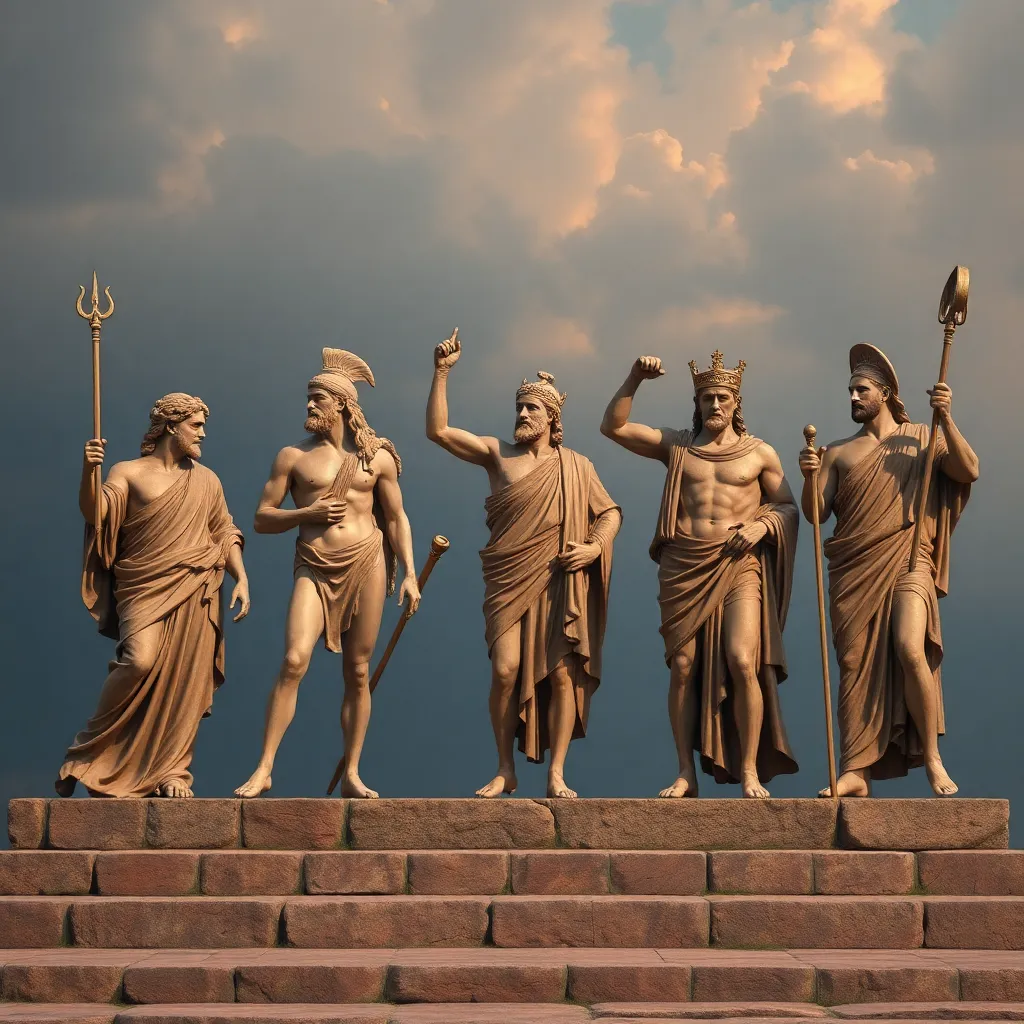The Olympians and Their Role in the Development of Ancient Greek Law
I. Introduction
Ancient Greek society, renowned for its rich cultural heritage and philosophical advancements, also developed a complex legal system that laid the foundation for Western legal thought. The interplay of mythology, religion, and law was a defining characteristic of this society, with the Olympian gods at the center of cultural and legal contexts. The Olympians were not merely deities to be worshiped; they played a pivotal role in shaping the moral and legal landscape of Ancient Greece. This article will explore the profound influence of the Olympians on the development of Greek law, examining their attributes, the myths that conveyed legal principles, and the rituals that intertwined religion with legal practices.
II. The Olympian Pantheon: A Brief Overview
The Olympian gods and goddesses, residing on Mount Olympus, were central figures in Ancient Greek mythology. Each deity embodied specific attributes and ruled over various aspects of life, including justice and order. Key Olympians relevant to the legal system included:
- Zeus: The king of the gods, presiding over law and order, and known for his role in upholding justice.
- Themis: The goddess of divine law and order, often depicted holding scales, symbolizing fairness and justice.
- Athena: The goddess of wisdom and war, revered for her role in guiding just governance and legal matters.
- Nemesis: The goddess of retribution, ensuring that justice was served and balance was maintained.
The significance of divine authority in Ancient Greek culture cannot be overstated. The belief that gods influenced human affairs instilled a sense of moral responsibility among the populace, encouraging adherence to laws that were perceived as divinely inspired.
III. Mythology and Morality: The Foundation of Legal Principles
Myths played a crucial role in shaping societal values and were integral to the moral fabric of Ancient Greece. These narratives often conveyed legal principles and moral lessons that influenced public perception of justice. For instance:
- The story of Orestes, who avenged his father’s murder by killing his mother, raised questions about justice and revenge, leading to the establishment of the concept of trial and the role of the courts.
- The tale of Prometheus, who defied Zeus by giving fire to humanity, highlighted themes of punishment and the consequences of challenging divine authority.
Such narratives served to illustrate the complexities of justice, reinforcing the idea that moral conduct was essential for societal harmony and that divine beings were deeply intertwined with legal matters.
IV. The Olympians as Lawgivers: Divine Inspiration
In various myths, gods are depicted as lawgivers, providing a divine framework for human laws. For example:
- Zeus was often seen as the ultimate authority in legal matters, enforcing laws that governed human behavior.
- Themis, as the embodiment of divine justice, was frequently invoked in legal contexts, representing the ideal of fairness and equity.
The connection between divine commands and human laws established a powerful precedent; laws were not merely human constructs but were viewed as reflections of divine will. This divine endorsement lent legitimacy and authority to the legal codes that governed ancient Greek society.
V. Rituals and Legal Practices Associated with the Olympians
Religious rituals played a significant role in ancient legal proceedings, reflecting the interconnectedness of law and religion. Key aspects included:
- Ritual sacrifices: Offered to the gods to seek favor in legal matters or to ensure just outcomes in trials.
- Oracles: Individuals, such as the Oracle of Delphi, who were consulted for divine guidance in legal disputes.
- Priesthood’s role: Priests acted as intermediaries between the divine and the human, interpreting the will of the gods in legal contexts.
Specific examples of rituals that integrated law and religion include the Thargelia, a festival where purifications and sacrifices were performed to ensure the community’s well-being and justice.
VI. The Concept of Arete and Its Legal Implications
Arete, meaning excellence or virtue, was a central concept in Ancient Greek philosophy, closely associated with the Olympians. The pursuit of Arete influenced legal standards and responsibilities, as it emphasized the importance of individual virtue in contributing to the greater good. Key points include:
- The notion that personal excellence should guide one’s actions, including adherence to laws and ethical standards.
- Arete fostered a sense of civic duty, encouraging individuals to act in ways that upheld both personal and communal values.
The relationship between individual virtue and communal law was evident; a society composed of virtuous individuals was believed to cultivate a just and harmonious legal system.
VII. Transition from Mythological to Rational Legal Systems
As Ancient Greek society evolved, so did its legal thought. This transition involved:
- Shifts in legal philosophy during the classical period, where rationality began to challenge divine authority.
- The decline of direct divine influence on legal matters, with an increasing reliance on human reasoning and empirical evidence.
- Despite these changes, the legacies of the Olympians persisted, influencing modern legal concepts such as justice, fairness, and morality.
This evolution marked a significant turning point in the development of legal systems, moving from a framework rooted in mythology to one based on rational thought and empirical observation.
VIII. Conclusion
In summary, the Olympians significantly contributed to the development of Greek law by providing a divine framework that shaped societal values, legal principles, and rituals. Their influence is evident in the moral narratives that guided public perception of justice and the rituals that intertwined law with religion. Even as legal thought transitioned towards rationality, the enduring impact of the Olympians remains a testament to the cultural and historical significance of mythology in shaping contemporary legal systems. Further exploration of the intersections between religion, culture, and law in history reveals the complexities and nuances that continue to inform our understanding of justice today.




